高考英语常用同义词辨析汇总
英语常用同义词辨析

英语常用同义词辨析habit, custom, manners, usage, practice, convention, tradition这些名词均含有“习惯,风俗,传统”之意。
habit〓侧重于自然养成的,不易去掉的个人习惯。
custom〓指一个国家、一个民族、一个地区或一个社会的习惯、行为方式或风俗习惯。
也可指个人的习惯。
manners〓指在某一时期或某一团体中盛行的社会礼仪或社会风俗模式。
usage〓指持续时间长,为很多人公认采纳的惯例、习俗。
practice〓常指习惯性的做法或行为。
convention〓多指约定俗成的行为方式规则或公认的标准,或指艺术上公认的技巧。
tradition〓广义指世代相传的伦理、行为规范和生活方式,特指因长久奉行而几乎具有法律效力的习惯、习俗,侧重历史意义。
hang, suspend这两个动词均含“挂,吊”之意。
hang〓通常指一端固定于一点或一条线上,另一端悬于空中的状态。
suspend〓侧重悬挂物支撑点的灵活性和活动自由。
happen, occur, chance, take place这些词语都可表示“发生”之意。
happen〓普通用词,泛指一切客观事物或情况的发生,强调动作的偶然性。
occur〓较正式用词,可指意外地发生,也可指意料中的发生。
chance〓侧重事前无安排或无准备而发生的事,特指巧合。
take place〓多指通过人为安排的发生。
happy, glad, cheerful, joyful, merry, delightful, gay, pleasant, nice, jolly, agreeable这些形容词均含“愉快的,高兴的”之意。
happy〓侧重感到满足、幸福或高兴。
glad〓最普通用词,语气较弱,表示礼貌的惯用语。
指乐于做某事或因某事而感到满足,常表愉快的心情。
cheerful〓多指因内心的愉快而表现出兴高采烈,是强调而自然的感情流露。
高考英语相似词语辨析
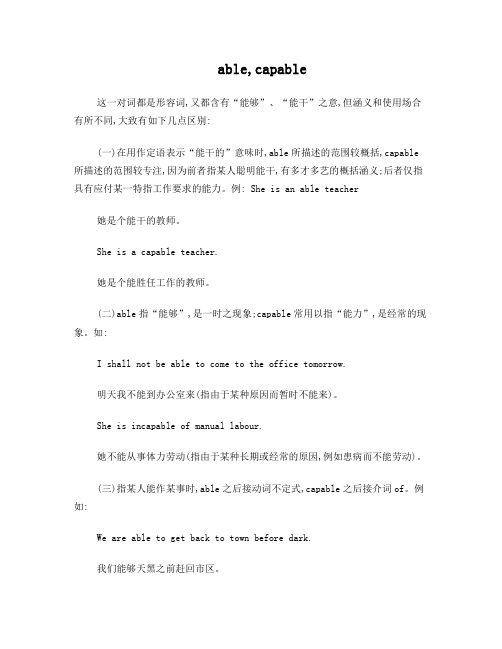
able,capable这一对词都是形容词,又都含有“能够”、“能干”之意,但涵义和使用场合有所不同,大致有如下几点区别:(一)在用作定语表示“能干的”意味时,able所描述的范围较概括,capable 所描述的范围较专注,因为前者指某人聪明能干,有多才多艺的概括涵义;后者仅指具有应付某一特指工作要求的能力。
例: She is an able teacher她是个能干的教师。
She is a capable teacher.她是个能胜任工作的教师。
(二)able指“能够”,是一时之现象;capable常用以指“能力”,是经常的现象。
如:I shall not be able to come to the office tomorrow.明天我不能到办公室来(指由于某种原因而暂时不能来)。
She is incapable of manual labour.她不能从事体力劳动(指由于某种长期或经常的原因,例如患病而不能劳动)。
(三)指某人能作某事时,able之后接动词不定式,capable之后接介词of。
例如:We are able to get back to town before dark.我们能够天黑之前赶回市区。
They are not capable of doing the work.他们没有能力做这件工作。
(四)capable除表示“有能力的”意味外,还可用以表示“有可能的”涵义,able则没有这个用法。
如:The situation is capable of improvement.此情况有可能好转。
That oil tanker is capable of being restored.那艘油轮有可能修好。
请注意,下列句中的able是用错了,应改为capable:This book is able to be translated.(错)This book is capable of being translated.(对)That law is able to be evaded.(错)That law is capable of being evaded.(对)(五)able 一般用作正面意义,指好人好事;capable 则是中性词,既可指好事,亦可指坏事,例如在下例中, capable of anything是表示“任何坏事都做得出来”之意:That guy is capable of anything!那家伙什么勾当都会干得出来!(六)able的反义词是unable;capable的反义词是incapable。
高中英语必修一同义词辨析分析

2.ignore/neglect/overlook 这一组动词都有"忽略"的意思。 ignore v.忽视,不理睬,指有意识地拒绝。 neglect v.忽视,忽略,疏忽,指无意识地忽视或忘记。
overlook v.忽略,疏漏,指有意识地遗漏,也可以指无意识地忽略。
3.Cheat/ fool 均含有“欺骗”之意。 cheat: 普通用词,指用蒙蔽他人的手段取得所需之物, 尤多指在赢利的买卖中欺骗人。 fool: 指把别人当傻瓜,愚弄欺骗别人
3.rise, raise, lift
这些动词均有“上升,举起”之意。 rise :普通用词,指具体的或抽象的事物由低向高移动。 The moon has not yet risen. 月亮还没有升起。
raise :及物动词,常用词,多指把某物从低处升到高处,有时作引申用。 All the students raised their hands.
必修一Unit1
1.calm/quiet/still/silent calm主要是用于指气候、海洋等风平浪静的。也 可指人,表示安静的镇静的。 quiet 指没有吵闹声的、没有噪音的。它强调声音 很小、很低或全无声音。 still 可以指环境的安静,也可以指姿势保持一动 不动。 silent 强调不发表意见,也可指“寂静”,强调没 有声音或沉默不语。
2.award,reward
这两个词都可以用作名词和动词,作名词时,意义相近,但不是同义词。 1、作名词时,award的意思是“奖品”、“奖金”,其义与prize近似,两者 都指因为作出杰出成就而受奖。. reward作名词时,其意为“赏金”、“酬金”或一些非金钱的报酬。 2、用作动词时,award的意思是“授予”、“颁发”、“判给”;reward则 表示“报答”、“酬谢”之意。
英语 常用同义词辨析

Synonym DiscriminationPart I1.abandon, desert, forsake, leave, give up这些动词或词组均含“抛弃、放弃”之意。
abandon:强调彻底地、完全地放弃某种打算、计划、希望、意见、主张,或职业、地位,亲友、妻室。
Eg: He abandoned all hopes of success. The heartless man abandoned his wife and children although they had no friends to take care of.desert:着重指违背法律责任和义务,或自己的信仰与誓言的行为,多含非难的意味。
Eg: Don’t desert me in the misfortune.forsake:侧重断绝感情上的依恋,自愿抛弃所喜欢的人或物。
也指抛弃信仰或改掉恶习。
Eg: His wife persuaded him to forsake his drinking habits.leave:普通用词,指舍弃某事或某一职业,或终止同一某人的关系,但不涉及动机与果。
give up:普通用语,侧重指没有希望或因外界压力而放弃。
relinquish:不愿意放弃,但又不得不放弃。
常用来表示放弃某种习惯,某种舍不得放弃的职业、计划、希望、信念、权利、要求等。
A parent relinquishes control over grown children.2. ability, capacity, capability, genius, talent, competence, faculty, gift, aptitude这些名词均可表示人的“能力,才能”之意。
ability:普通用词,指人先天的或学来的各种能力。
复数通常只指智力方面的才能。
capacity:侧重指人的潜在能力(capacities),通常不指体力,多指才智,尤指接受与领悟能力。
英语完形填空高考备考----词汇(同义词辨析)

高中常用同义词辨析汇总1. a good/great many(of)/a number of/a large quantity of/plenty of/a large amount of/a great deal of2. a number of/numbers of/the number of. . .3. abandon/desert4. abolish/cancel5. above all/first of all/at first6. accuse/charge/blame/scold7. acquire/obtain/gain/win/earn8. adjust/adapt9. adopt/adapt10. agreement/contract/bargain11. also/too/either/as well/besides/moreover12. anxious/eager/keen13. apart from/except/except for/except that/besides14. argue/debate/discuss/quarrel15. ashamed/shameful/shame16. at ease/with ease17. attempt/try/manage18. attend/join/join in/take part in/participate in19. average/common/ordinary/general/usual20. award/reward/prize21. beat/strike/hit22. because of/owing to/thanks to/due to23. before/since/until24. blame/condemn/scold25. bother/interrupt/trouble/disturb26. break into/break in27. burden/load28. calm/still/quiet/silent29. care about/care for30. cause/reason31. celebrate/congratulate/observe32. certain/sure33. choose/select/elect/pick34. close/closely35. come about/happen/take place/occur/break out36. come to power/be in powere true/realize38. common/ordinary/usual/average/universal39. compare/contrast40. conflict/fight/war/struggle41. confuse/puzzle42. consequently/so43. considerate/thoughtful44. constant/continual/continuousv1.0 可编辑可修改continuous adj. 不停的,连续不断的。
高考英语常用同义词辨析

高考英语常用同义词辨析英语中存在很多意义相近的单词或短语,而它们也给精准用词带来了障碍。
我们可以通过辨析来正确理解它们的异同,体会它们之间的细微差别,从而达到能够正确运用的目的。
下面小编就带大家一起来看几组近义词,看看它们有什么不同。
1wage/pay/salary:以上各词均指收入、工资、薪水。
e.g.a weekly wage of$200周薪200美元Her job is hard work,but the pay is good.她工作虽辛苦,但薪水不低。
His annual salary is just under$48,000.他的年薪将近48,000美元。
2look/glance/stare/glare/gaze/glimpse:以上各词均表示看的意思。
e.g.Here,have a look at this.来,看一看这个。
She stole a glance at her watch.她偷偷看了看表。
She gave the officer a blank stare and shrugged her shoulders.她面无表情地盯着那个军官,耸了耸肩。
She fixed her questioner with a hostile glare.她带着敌意瞪着向她提问的人。
She felt embarrassed under his steady gaze.她在他凝视的目光下感到很尴尬。
He caught a glimpse of her in the crowd.他在人群里一眼瞥见了她。
3recommend/advise/advocate/urge:以上各词均含劝告、建议之义。
e.g.We’d recommend you to book your flight early.我们建议你早点儿预订航班。
I’d advise you not to tell him.我劝你别告诉他。
高考英语写作常用同义词辨析基础版

这些形容词均含“稀罕的,很少发生”之意。
occasional: 指偶然、不时或间或发生的事,侧重无规律可循。
uncommon: 指一般不发生或很少发生的事情,故显得独特、异常与例外。
scare: 指暂时不易发现、不存在或数量不足,供不应求的东西。
这些形容词均含“新的”之意。
new: 普通用词,与old相对,指最近的或创新的。
fresh: 指新鲜的、新做的,侧重创新。
novel: 侧重新事物的新奇和独特。
original: 强调独创性。
innovative: 强调富有创新和革新精神。
news, information, intelligence
note语气比notice强,指不仅注意到,而且记录下来,侧重注意的认真与仔细。
mind: 指用心地去观察,了解某人或某物以达到某一目的。常用于命令句中。
attend: 一般用词,侧重专心于某事。
remark: 一般指经过思维活动而注意到。
nourish, feed, graze
这些动词均含“提供所需食物,喂养”之意。
officer, official
这两个名词均含“官员”之意。
officer: 主要指军官或警官,有时也的指文职官员或高级职员。
official: 通常指文职官员,公职人员。有时也指军官或警官。
onlyቤተ መጻሕፍቲ ባይዱ single, sole, unique, alone
这些形容词均可表示“唯一的”之意。
nurse: 通常指对无力自顾的婴儿、病人等进行照料或护理。
tend: 指出于责任心、博爱心而不是私人感情去对人或物进行照顾。
高考英语常用同近义词词汇辨析5
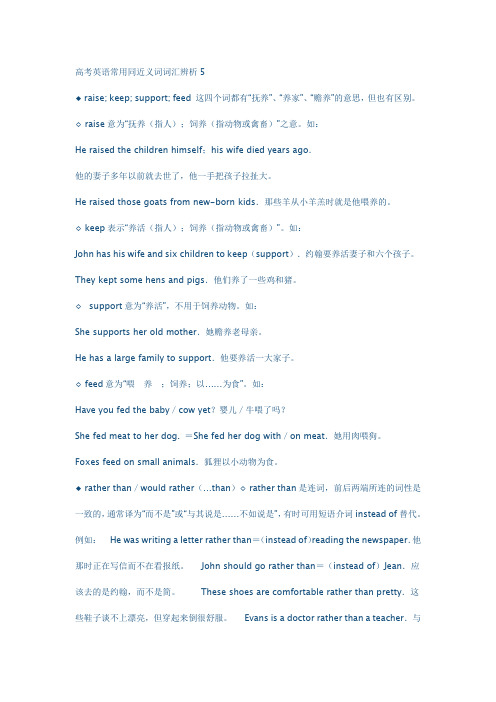
高考英语常用同近义词词汇辨析5◆ raise; keep; support; feed 这四个词都有“抚养”、“养家”、“赡养”的意思,但也有区别。
◇ raise意为“抚养(指人);饲养(指动物或禽畜)”之意。
如:He raised the children himself;his wife died years ago.他的妻子多年以前就去世了,他一手把孩子拉扯大。
He raised those goats from new-born kids.那些羊从小羊羔时就是他喂养的。
◇ kee p表示“养活(指人);饲养(指动物或禽畜)”。
如:John has his wife and six children to keep(support).约翰要养活妻子和六个孩子。
They kept some hens and pigs.他们养了一些鸡和猪。
◇support意为“养活”,不用于饲养动物。
如:She supports her old mother.她赡养老母亲。
He has a large family to support.他要养活一大家子。
◇ feed意为“喂 养;饲养;以……为食”。
如:Have you fed the baby/cow yet?婴儿/牛喂了吗?She fed meat to her dog. =She fed her dog with/on meat.她用肉喂狗。
Foxes feed on small animals.狐狸以小动物为食。
◆ rather than/would rather(…than)◇ rather than是连词,前后两端所连的词性是一致的,通常译为“而不是”或“与其说是……不如说是”,有时可用短语介词instead of替代。
例如:He was writing a letter rather than=(instead of)reading the newspaper.他那时正在写信而不在看报纸。
高考英语高频同义近义词语辨析
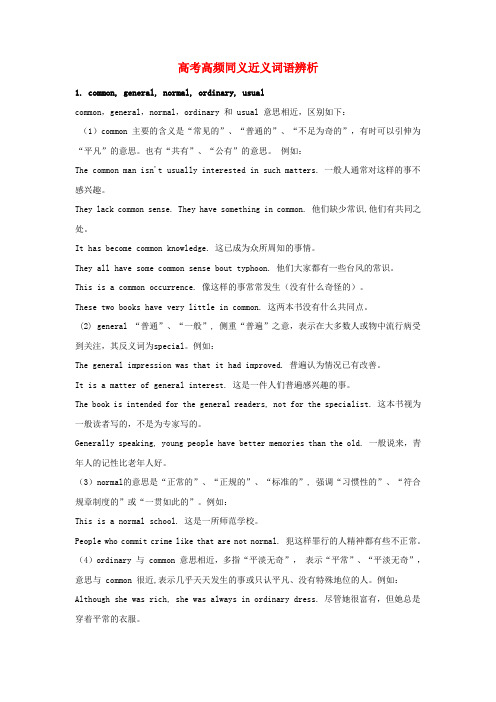
高考高频同义近义词语辨析1. common, general, normal, ordinary,usualcommon,general,normal,ordinary 和 usual 意思相近,区别如下:(1)common 主要的含义是“常见的”、“普通的”、“不足为奇的”,有时可以引伸为“平凡”的意思。
也有“共有”、“公有”的意思。
例如:The common man isn't usually interested in such matters. 一般人通常对这样的事不感兴趣。
They lack common sense. They have something in common. 他们缺少常识,他们有共同之处。
It has become common knowledge. 这已成为众所周知的事情。
They all have some common sense bout typhoon. 他们大家都有一些台风的常识。
This is a common occurrence. 像这样的事常常发生(没有什么奇怪的)。
These two books have very little in common. 这两本书没有什么共同点。
(2) general “普通”、“一般”, 侧重“普遍”之意,表示在大多数人或物中流行病受到关注,其反义词为special。
例如:The general impression was that it had improved. 普遍认为情况已有改善。
It is a matter of general interest. 这是一件人们普遍感兴趣的事。
The book is intended for the general readers, not for the specialist. 这本书视为一般读者写的,不是为专家写的。
Generally speaking, young people have better memories than the old. 一般说来,青年人的记性比老年人好。
英语同义词辨析大全
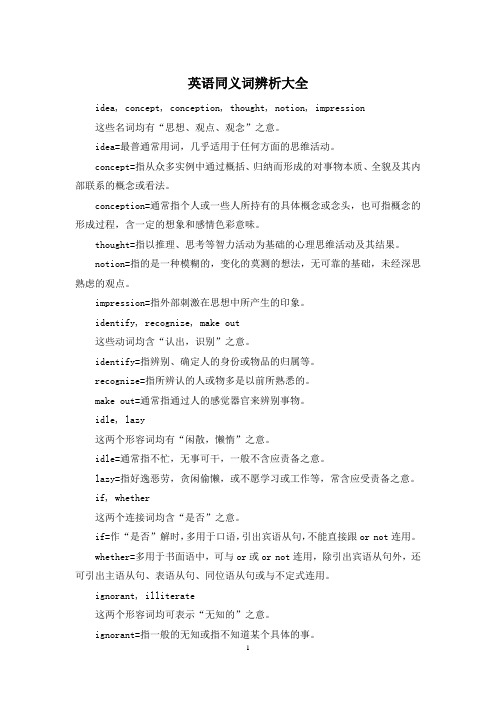
英语同义词辨析大全idea, concept, conception, thought, notion, impression这些名词均有“思想、观点、观念”之意。
idea=最普通常用词,几乎适用于任何方面的思维活动。
concept=指从众多实例中通过概括、归纳而形成的对事物本质、全貌及其内部联系的概念或看法。
conception=通常指个人或一些人所持有的具体概念或念头,也可指概念的形成过程,含一定的想象和感情色彩意味。
thought=指以推理、思考等智力活动为基础的心理思维活动及其结果。
notion=指的是一种模糊的,变化的莫测的想法,无可靠的基础,未经深思熟虑的观点。
impression=指外部刺激在思想中所产生的印象。
identify, recognize, make out这些动词均含“认出,识别”之意。
identify=指辨别、确定人的身份或物品的归属等。
recognize=指所辨认的人或物多是以前所熟悉的。
make out=通常指通过人的感觉器官来辨别事物。
idle, lazy这两个形容词均有“闲散,懒惰”之意。
idle=通常指不忙,无事可干,一般不含应责备之意。
lazy=指好逸恶劳,贪闲偷懒,或不愿学习或工作等,常含应受责备之意。
if, whether这两个连接词均含“是否”之意。
if=作“是否”解时,多用于口语,引出宾语从句,不能直接跟or not连用。
whether=多用于书面语中,可与or或or not连用,除引出宾语从句外,还可引出主语从句、表语从句、同位语从句或与不定式连用。
ignorant, illiterate这两个形容词均可表示“无知的”之意。
ignorant=指一般的无知或指不知道某个具体的事。
illiterate=指不识字的人或没有文化的人。
ill, sick这两个形容词均有“生病的”之意。
ill=在英国较常用,指“生病”时,通常作表语,不可作定语。
在美国,ill 用作表语时可与sick换用。
英语完形填空高考备考----词汇(同义词辨析)
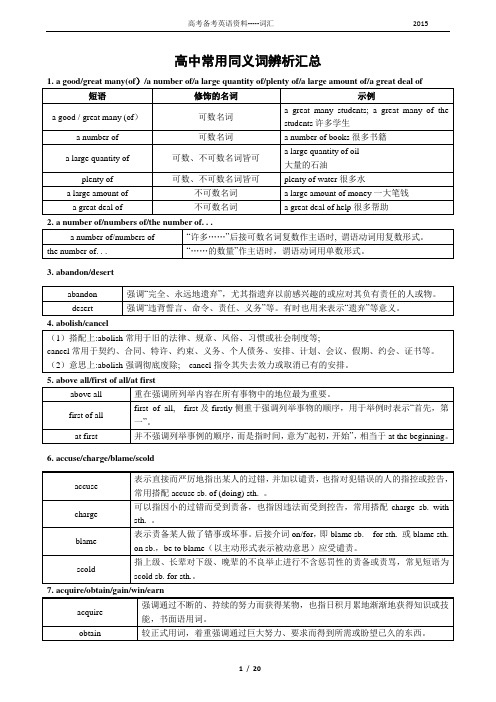
高中常用同义词辨析汇总3. abandon/desert6. accuse/charge/blame/scold12. anxious/eager/keen13. apart from/except/except for/except that/besides14. argue/debate/discuss/quarrel15. ashamed/shameful/shame16. at ease/with ease17. attempt/try/manage19. average/common/ordinary/general/usual20. award/reward/prize21. beat/strike/hit38. common/ordinary/usual/average/universal45. consult/look upconsult 意为“查阅书籍等以获得信息”,其宾语一般是dictionary, book, magazine, telephone, directory, map, railway, guide等名词。
look up 意为“在词典或其他工具书中查找某信息”,其宾语为需要查找的内容,如word, phrase, idiom, slang, proverb, phone number, place, name等名词或短语。
46. contain/include/holdcontain意为“包含,含有,容纳,里面装有”,指的是包含的全部内容或容量,也可指里面所含的成分,一般不用于进行时态。
include通常表示把某事物作为其中的一部分包含在内。
在句中常构成分词短语sth. included或includingsth. 。
hold通常指有能力容纳。
/ 47. content/satisfactorycontent adj. 用来修饰人,表示对某一事物的满意,只用作表语。
高考英语复习素材:高中常用同义词辨析汇总[ 高考]
![高考英语复习素材:高中常用同义词辨析汇总[ 高考]](https://img.taocdn.com/s3/m/78783fe680eb6294dd886c9a.png)
三、高中常用同义词辨析汇总1. a good/great many(of)/a number of/a large quantity of/plenty of/a large amount of/a great deal of2. a number of/numbers of/the number of. . .3. abandon/desert4. abolish/cancel5. above all/first of all/at first6. accuse/charge/blame/scold7. acquire/obtain/gain/win/earn8. adjust/adapt9. adopt/adapt10. agreement/contract/bargain11. also/too/either/as well/besides/moreover12. anxious/eager/keen13. apart from/except/except for/except that/besides14. argue/debate/discuss/quarrel15. ashamed/shameful/shame16. at ease/with ease17. attempt/try/manage18. attend/join/join in/take part in/participate in19. average/common/ordinary/general/usual20. award/reward/prize21. beat/strike/hit22. because of/owing to/thanks to/due to23. before/since/until24. blame/condemn/scold25. bother/interrupt/trouble/disturb26. break into/break in27. burden/load28. calm/still/quiet/silent29. care about/care for30. cause/reason31. celebrate/congratulate/observe32. certain/sure33. choose/select/elect/pick34. close/closely35. come about/happen/take place/occur/break out36. come to power/be in powere true/realize38. common/ordinary/usual/average/universal39. compare/contrast40. conflict/fight/war/struggle41. confuse/puzzle42. consequently/so43. considerate/thoughtful44. constant/continual/continuous45. consult/look up46. contain/include/hold/ 47. content/satisfactory48. contribute/devote49. convey/transport50. cope with/deal with/do with51. create/invent/discover52. cure/treat/heal53. deal with/do with54. declare/announce/claim55. decline/refuse/reject56. defeat/beat/win/conquer57. defend/guard/protect58. demand/require/request59. determine to do/be determined to do60. direct/directly61. disturb/interrupt62. divide(into)/separate(from)63. dress/wear/put/pull on/have on64. employ/hire/rent65. empty/vacant66. energy/force/power/strength67. ensure/assure/insure68. ensure/guarantee/promise69. escape/flee70. examine/check/test/inspect71. expand/extend/spread/stretch72. expense/cost/price/fee/ charge /fare73. expose/uncover74. fault/mistake/wrong75. fit/suitable/proper/appropriate76. fit/suit/match77. force/strength/energy/power78. forgive/excuse79. gain/earn/get/win80. gather/collect81. give in/give up82. give out/(sth. ) run out/(sb. ) run out of sth. /(sb. ) use up sth.83. glare at/glance at/stare at/look at。
英语常用同义词辨析

英语常用同义词辨析高考英语常用同义词辨析1.face与confront这两个动词均含“面对”之意。
face口语用词,含义广,侧重有勇气、决心或自信心去面对。
confront书面用词,多指勇敢、冷静地面临某种问题、困难或任务等。
2.factory、mill、plant与works这些名词都有“工厂”之意。
factory最普通用词,可泛指任何制造产品的地方。
mill原义指粮食加工厂。
现多指轻工业类的工厂。
plant多指电力或机械制造方面的工厂。
works多指钢铁等重工业方面的工厂,也指一些特定的厂。
3.fade与wither这两个动词都有“凋谢”之意。
fade侧重指渐渐失去色彩和光泽。
wither指因无活力而丧失生命力。
4.faithful、loyal、constant与true这些形容词均含有“忠实的”之意。
faithful多指对人对事或对诺言、誓言的始终不渝,侧重在任何情况下都绝不改变。
loyal一般指对祖国、领袖的忠诚或对事业、原则、誓言的忠实,不动摇。
constant侧重指思想状态的稳定或信念的坚定,也指爱情或感情等的忠贞不渝。
true侧重个人感情上的忠实和不动摇。
5.fair与market这两个名词均有“集市,市场”之意。
fair一般指在乡村小镇定期举行的买卖牛羊或农产品等的集市。
现引申指国际性的博览会、交易会等。
market指人们购买货品的地方,经常出售商品的市场。
6.fairly、pretty、quite与rather这些程度副词都有“相当,颇”之意。
fairly语意最弱,多用于褒义,表示适度地、尚可的意思。
不可与too或比较级连用。
pretty用法与rather相似。
常用于非正式文体。
quite含义比fairly稍强,与不定冠词连用时,一般放在不定冠词之前。
rather语气比quite强,褒意贬意无可使用。
可与too和比较级连用。
7.fake,false这两个形容词都含有“假的”之意。
英语同义词辨析(超级实用)

一、ability, capacity, capability, genius, talent, competence,faculty, gift, aptitude 这些名词均可表示人的“能力,才能”之意。
1.ability :普通用词,指人先天的或学来的各种能力。
2.capacity :侧重指人的潜在能力,通常不指体力,多指才智,尤指接受与领悟能力。
3.capability :多用于人,指胜任某项具体工作的能力,也指本身具有、尚未发挥的潜在能力。
常与of或for连用。
4.genius :语气最强,指天赋的高度才能与智力。
5.talent :着重指人某方面具有可发展和倍养的突出天赋才能,但语意比genius弱。
petence :正式用词,侧重指令人满意的业务能力与水平,达到胜任某项工作等的要求。
7.faculty :指特殊的才能或智力。
8.gift :着重个人的天赋的才能或在某方面的显著本领,常暗含不能用一般规律作解释的意味。
9.aptitude :多指先天或后天习得的运用自如的能力,常暗示接受能力强,能迅速掌握一种学术训练或艺术技巧。
二、able, capable, competent 这些形容词均含有“有能力的,能干的”之意1.able :最常用词,多用于褒义,着重指多方面的,经常性的,或潜在性的能力。
有时也指高超、非凡的能力。
2.capable :语气弱于able,指有能力、有潜力或有条件做某事,常与of连用。
petent :强调具有能胜任某项工作的足够技能或其它所需的条件。
三、abandon, desert, forsake, leave, give up 这些动词或词组均含“抛弃、放弃”之意1.abandon :强调永远或完全放弃或抛弃人或事物等,这可能是被迫的,也可能是自愿的。
2.desert :着重指违背法律责任和义务,或自己的信仰与誓言的行为,多含非难的意味。
3.forsake :侧重断绝感情上的依恋,自愿抛弃所喜欢的人或物。
高考英语常见近义词辨析整理
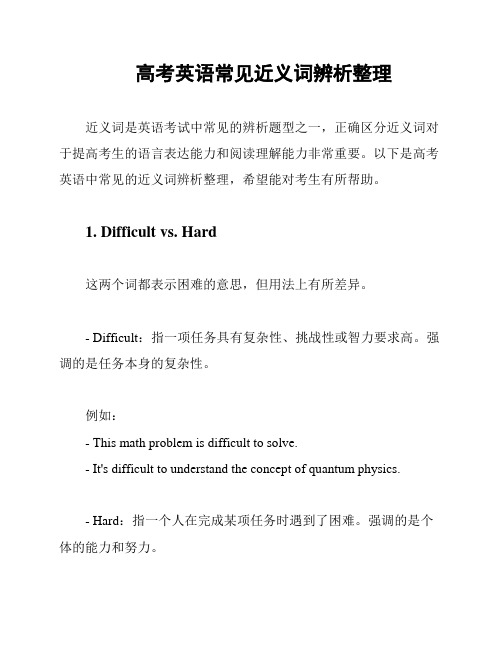
高考英语常见近义词辨析整理近义词是英语考试中常见的辨析题型之一,正确区分近义词对于提高考生的语言表达能力和阅读理解能力非常重要。
以下是高考英语中常见的近义词辨析整理,希望能对考生有所帮助。
1. Difficult vs. Hard这两个词都表示困难的意思,但用法上有所差异。
- Difficult:指一项任务具有复杂性、挑战性或智力要求高。
强调的是任务本身的复杂性。
例如:- This math problem is difficult to solve.- It's difficult to understand the concept of quantum physics.- Hard:指一个人在完成某项任务时遇到了困难。
强调的是个体的能力和努力。
例如:- I found the math problem hard to solve.- He worked hard to understand the concept of quantum physics.2. Accept vs. Except这两个词往往容易混淆,但意思截然不同。
- Accept:表示接受或同意。
例如:- I accept your apology.- The university accepted her application.- Except:表示除了、排除。
例如:- Everyone is here except John.- I like all fruits except for bananas.3. Advise vs. Advice这两个词都与建议有关,但用法有所不同。
- Advise:动词形式,表示提供建议或告诉某人该做什么。
例如:- I advise you to study harder for the exam.- The doctor advised her to get more exercise.- Advice:名词形式,表示建议或忠告。
英语同义词近义词辨析知识讲解
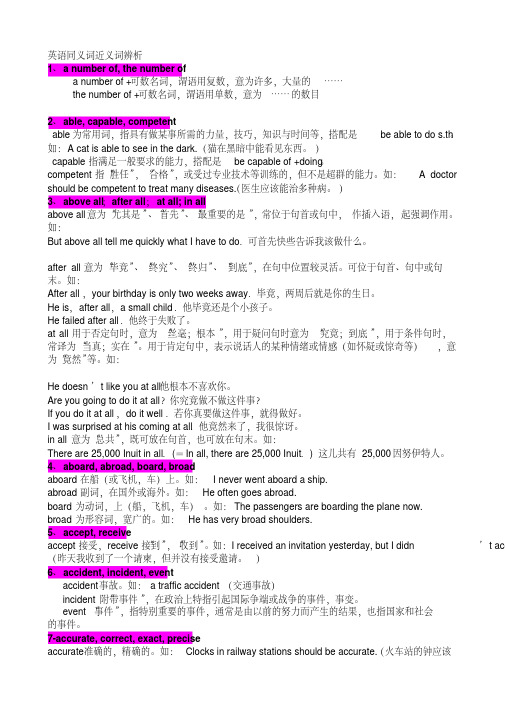
英语同义词近义词辨析1、a number of, the number ofa number of +可数名词,谓语用复数,意为许多,大量的……the number of +可数名词,谓语用单数,意为……的数目2、able, capable, competentable为常用词,指具有做某事所需的力量,技巧,知识与时间等,搭配是be able to do s.th。
如:A cat is able to see in the dark. (猫在黑暗中能看见东西。
)capable 指满足一般要求的能力,搭配是be capable of +doing。
competent 指“胜任”,“合格”,或受过专业技术等训练的,但不是超群的能力。
如: A doctorshould be competent to treat many diseases. (医生应该能治多种病。
)3、above all;after all;at all; in allabove all意为“尤其是”、“首先”、“最重要的是”,常位于句首或句中,作插入语,起强调作用。
如:But above all tell me quickly what I have to do.可首先快些告诉我该做什么。
after all意为“毕竟”、“终究”、“终归”、“到底”,在句中位置较灵活。
可位于句首、句中或句末。
如:After all,your birthday is only two weeks away.毕竟,两周后就是你的生日。
He is,after all,a small child.他毕竟还是个小孩子。
He failed after all.他终于失败了。
at all用于否定句时,意为“丝毫;根本”,用于疑问句时意为“究竟;到底”,用于条件句时,常译为“当真;实在”。
用于肯定句中,表示说话人的某种情绪或情感(如怀疑或惊奇等),意为“竟然”等。
如:.他根本不喜欢你。
高中英语高考近义词同义词辨析(共18组)

高考英语近义词同义词辨析(1) grain; corn; cropgrain:指稻、麦等谷类及其粒子。
corn:主要指大麦、小麦、燕麦、裸麦、玉蜀黍这5种谷物及其粒子。
crop:指谷物或果类等一年或一季的收成,也可指地里的农业作物或谷物。
Farmers grow grain and keep cattle.农民种谷养牛。
He filled the barn to the roof with corn.他将谷仓装满了谷物。
The main crop is wheat and this is grown even on the very steep slopes.主要作物是小麦,就连很陡的坡地都种上了小麦。
(2)hurt; wound; injure; harmhurt:表示“肉体或情感上的痛苦,强调疼痛感”。
wound:表示“由于剑、刀、枪等锐器造成身体上较严重的外伤,特别是在战争中受伤”。
injure:表示“指意外事故或偶发事件造成的伤害”。
harm:表示“引起疼痛、痛苦或损失,其对象可以是自己,也可以是其他人或物”。
Many people were hurt when a bus and a truck collided.一辆公共汽车和一辆卡车相撞,许多人受了伤。
The soldier was wounded in the arm.这个士兵的胳膊受伤了。
There were two people injured in the car accident.有两个人在车祸中受了伤。
Getting up early won' harm you!早起对你没有坏处。
(3)affair; thing; matter; businessaffair:意为“事情、事件”,含义较广,泛指已做或待做的事。
复数affairs一般指商业事务及政府的日常事务,如财政管理、外交事务等。
thing:意为“事情、事物”,不管大事小事、好事坏事均称为thing, 一般不能专指事务。
- 1、下载文档前请自行甄别文档内容的完整性,平台不提供额外的编辑、内容补充、找答案等附加服务。
- 2、"仅部分预览"的文档,不可在线预览部分如存在完整性等问题,可反馈申请退款(可完整预览的文档不适用该条件!)。
- 3、如文档侵犯您的权益,请联系客服反馈,我们会尽快为您处理(人工客服工作时间:9:00-18:30)。
高考英语常用同义词辨析汇总1. a good/great many(of)/a number of/a large quantity of/plenty of/a large amount of/a great deal of2. a number of/numbers of/the number of. . .3. abandon/desert4. abolish/cancel5. above all/first of all/at first6. accuse/charge/blame/scold7. acquire/obtain/gain/win/earn8. adjust/adapt9. adopt/adapt10. agreement/contract/bargain11. also/too/either/as well/besides/moreover12. anxious/eager/keen13. apart from/except/except for/except that/besides14. argue/debate/discuss/quarrel15. ashamed/shameful/shame16. at ease/with ease17. attempt/try/manage18. attend/join/join in/take part in/participate in19. average/common/ordinary/general/usual20. award/reward/prize21. beat/strike/hit22. because of/owing to/thanks to/due to23. before/since/until24. blame/condemn/scold25. bother/interrupt/trouble/disturb26. break into/break in27. burden/load28. calm/still/quiet/silent29. care about/care for30. cause/reason31. celebrate/congratulate/observe32. certain/sure33. choose/select/elect/pick34. close/closely35. come about/happen/take place/occur/break out36. come to power/be in powere true/realize38. common/ordinary/usual/average/universal39. compare/contrast40. conflict/fight/war/struggle41. confuse/puzzle42. consequently/so43. considerate/thoughtfulthoughtful 指为他人着想,主动关怀,做有益于他人的事。
44. constant/continual/continuousconstant adj. 不断的,经常的。
强调始终如一地经常出现。
continual adj. 连续不断的,频繁的。
表示时断时续地发生。
continuous adj. 不停的,连续不断的。
强调中间不停顿。
45. consult/look upconsult意为“查阅书籍等以获得信息”,其宾语一般是dictionary, book,magazine, telephone, directory, map, railway, guide等名词。
look up 意为“在词典或其他工具书中查找某信息”,其宾语为需要查找的内容,如word, phrase, idiom, slang, proverb, phone number, place, name等名词或短语。
46. contain/include/holdcontain意为“包含,含有,容纳,里面装有”,指的是包含的全部内容或容量,也可指里面所含的成分,一般不用于进行时态。
include通常表示把某事物作为其中的一部分包含在内。
在句中常构成分词短语sth. included或including sth. 。
hold通常指有能力容纳。
/ 47. content/satisfactory48. contribute/devote49. convey/transport50. cope with/deal with/do with51. create/invent/discover52. cure/treat/heal53. deal with/do with54. declare/announce/claim55. decline/refuse/reject56. defeat/beat/win/conquer57. defend/guard/protect58. demand/require/request59. determine to do/be determined to do60. direct/directly61. disturb/interrupt62. divide(into)/separate(from)63. dress/wear/put/pull on/have on64. employ/hire/rent65. empty/vacant66. energy/force/power/strength67. ensure/assure/insure68. ensure/guarantee/promise69. escape/flee70. examine/check/test/inspect71. expand/extend/spread/stretch72. expense/cost/price/fee/ charge /fare73. expose/uncover74. fault/mistake/wrong75. fit/suitable/proper/appropriate76. fit/suit/match77. force/strength/energy/power78. forgive/excuse79. gain/earn/get/win80. gather/collect81. give in/give up如“give it in”。
表示“放弃(希望);不再做(某事);把……献给”的意思,作及物give up动词短语用,其后接名词或动词-ing形式作宾语。
82. give out/(sth. ) run out/(sb. ) run out of sth. /(sb. ) use up sth.表示“用尽, 耗光”时多用作不及物动词短语, 不用被动形give out式。
不及物动词短语, 没有被动语态。
主语多为时间、金钱、(sth. ) run out食物等。
(sb. ) run out of sth.及物动词短语, 后接宾语。
(sb. ) use up sth.及物动词短语, 有被动语态(sth. ) be used up。
83. glare at/glance at/stare at/look atglare at“瞪眼;怒目而视”。
“匆匆一看,扫视;一瞥;浏览”。
指速度非常快地看一看某人或glance at某物的大体轮廓,或粗略地浏览。
“目不转睛地看,盯着,凝视”。
表示由于害怕、深思或惊吓而张stare at大眼睛看。
look at“看(着)”,指把眼睛转向目标。
84. habit/custom/practice85. ignore/overlook86. imaginative/imaginary87. in addition/besides/except/except for/apart from88. in case/in case of89. in search of/search/search for/search. . . for. . .90. in spite of/despite/though/although/as91. in turn/by turns/in return92. incident/accident/event93. influence/effect/impact/affect94. injure/hurt/wound/harm/damage95. join/participate/take part in/attend96. lead to/lie in97. lie的变化/lay的变化98. likely/possible/probable99. lively/alive/live/living100. look back on sth. /call up101. lost/missing/gone102. make sense/make sense of103. manage/try/attempt104. method/way/means/manner/approach105. on the contrary/on the other hand106. only if/if only107. persuade/advise108. pity/mercy/sympathy109. product/produce/production110. prohibit/forbid/ban111. raise/rise/arise112. real/true113. realize/recognise/know114. regardless of/in spite of115. remove/move116. represent/on behalf of/stand for117. rescue/save118. rob/steal119. ruin/destroy/damage/harm120. scenery/scene/view/sight121. seem/appear122. sensible/sensitive123.124. separate/divide125. set up/found/build/put up126. settle/solve127. situation/condition/state/circumstance128. stay/remain129. stick to/persist/insist130. submit. . . to. . . /submit to131. substitute/replace132. suffer/suffer from133. supply/provide/offer134. suspect/doubt135. symbol/signal/sign/mark136. take it easy/take one’s time137. take place/take the place of/take one’s place138. treasure/wealth/fortune/possession139. use up/give out/run out/run out of140. used to do/be/get used to doing sth. /be used to do sth.141. way/method/means/manner/approach142. while/when/as143. worth/worthy/worthwhile。
